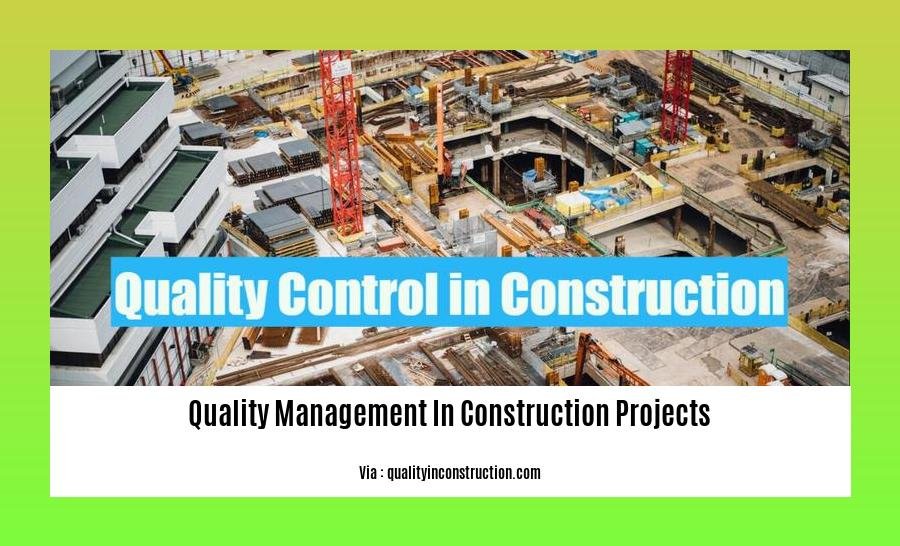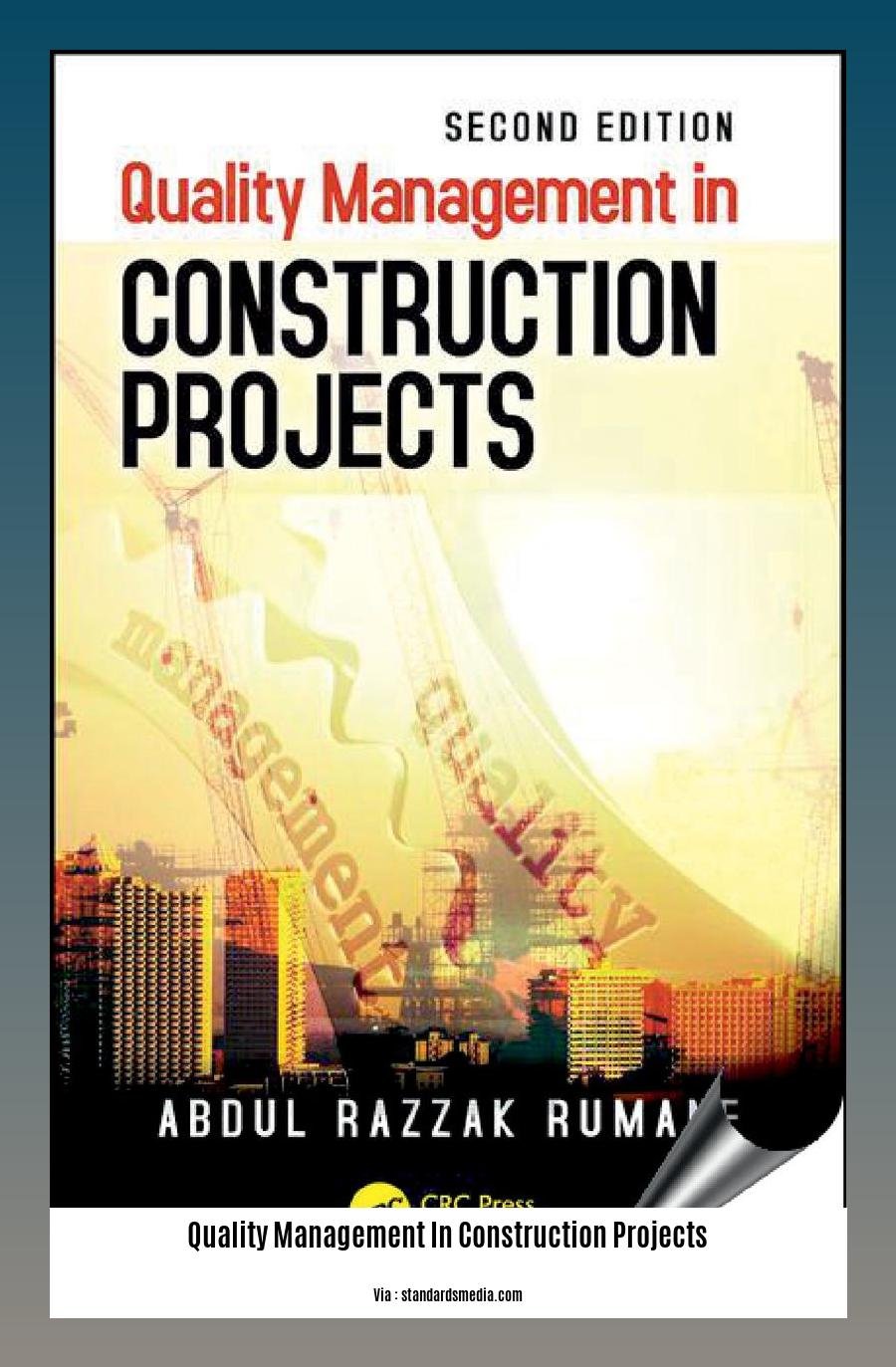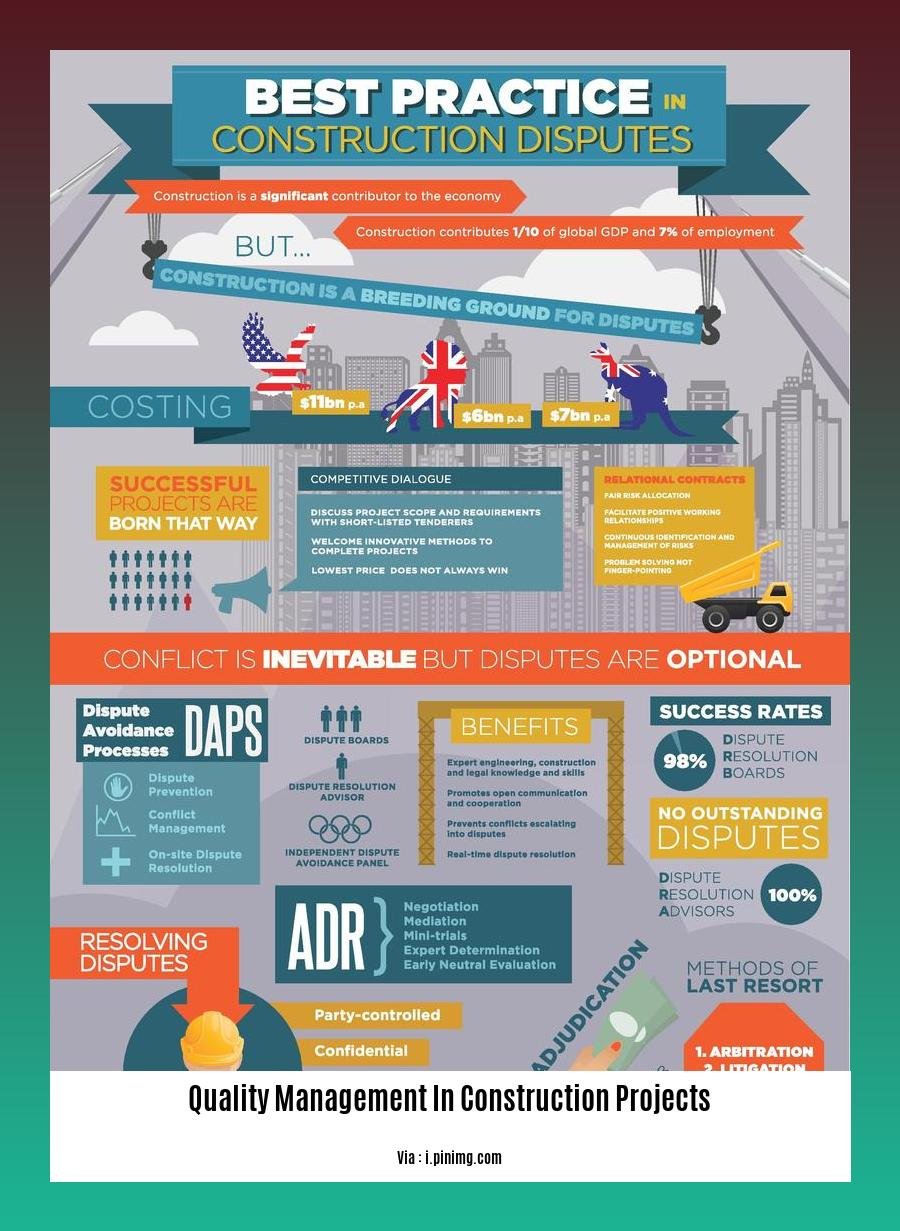Discover the intricacies of quality management in construction projects with this comprehensive guide. Delving into industry-leading practices, this article provides invaluable insights into the implementation and maintenance of robust quality systems, ensuring the successful delivery of exceptional construction projects.
Key Takeaways:
- Quality management is crucial for ensuring successful construction projects by minimizing defects, maximizing efficiency, and enhancing overall project outcomes.
- Implement a robust quality management system that aligns with industry standards and project-specific requirements.
- Establish clear quality plans, procedures, and checklists to guide project execution and ensure consistent quality.
- Engage project teams and stakeholders throughout the quality management process for effective decision-making and buy-in.
- Conduct regular inspections, audits, and assessments to monitor quality and identify areas for improvement.
- Leverage technology and tools to streamline quality management processes and improve efficiency.
- Embrace a continuous improvement mindset to drive ongoing quality enhancements.
- Foster a culture of quality awareness and accountability among project participants.
- Effective quality management leads to increased customer satisfaction, reduced rework, and improved project performance.
Quality Management in Construction Projects

Imagine embarking on a construction project akin to building an intricate masterpiece. Just as a painter meticulously blends colors, a sculptor carefully chisels stone, quality management in construction projects ensures the unwavering integrity of your project. It’s the guiding force that transforms blueprints into flawless structures.
Unveiling the Phases of Quality Management
- Planning: Chart the path to excellence by defining quality objectives, establishing clear communication channels, and outlining roles and responsibilities.
- Implementation: Bring plans to life by implementing quality control measures, conducting inspections, and training personnel.
- Monitoring: Stay vigilant by monitoring progress, identifying deviations, and promptly addressing any issues.
- Improvement: Continuously strive for perfection by analyzing data, identifying areas for enhancement, and implementing corrective actions.
Embracing the Benefits of Quality Management
- Enhanced Customer Satisfaction: Deliver projects that exceed expectations, fostering lasting relationships with clients.
- Reduced Costs: Prevent costly errors and rework by proactively addressing quality issues throughout the project lifecycle.
- Increased Efficiency: Streamline processes, eliminate bottlenecks, and improve productivity by implementing best practices.
- Improved Safety: Foster a quality-conscious culture that prioritizes safety, minimizing risks and ensuring the well-being of workers.
Tips for Effective Quality Management
- Engage stakeholders: Involve everyone from architects to subcontractors in the quality management process to ensure alignment and accountability.
- Use technology: Leverage software and tools to automate tasks, improve communication, and track progress.
- Focus on continuous improvement: Embrace a mindset of constant refinement, seeking feedback and implementing best practices.
Ultimately, quality management in construction projects is an investment in excellence. It empowers you to deliver high-quality projects on time and within budget, leaving a lasting legacy of craftsmanship and satisfaction.
Understand the QA and QC job responsibilities in the construction industry to ensure the unwavering quality of your projects. Delve into the meaning of QA/QC in construction to grasp the importance of quality control in this field. Explore the essential qualifications for a career in construction to equip yourself with the necessary skills and knowledge. Enhance your construction knowledge by understanding the significance of quality in building construction and the implementation of quality management systems for construction companies.
Monitoring and Inspection in Construction Quality Management

Ensuring the quality of construction projects is crucial for client satisfaction, reduced defects, and project success. Monitoring and Inspection play a vital role in this process, allowing project teams to track progress, identify deviations, and address issues proactively.
Monitoring involves regularly observing and measuring project activities to ensure adherence to quality standards. This includes:
- Regular inspections: Physical examinations of materials, workmanship, and processes to identify potential defects or non-conformances.
- Data collection: Recording observations, measurements, and test results to track progress and identify trends.
- Documentation: Maintaining accurate records of inspections, test results, and any corrective actions taken.
Inspection is a more thorough examination performed at specific project milestones or when issues are detected. It involves:
- Detailed examinations: Closely inspecting materials, workmanship, and systems to assess compliance with specifications.
- Non-destructive testing: Using specialized techniques (e.g., ultrasonic testing) to evaluate internal components without causing damage.
- Review of documentation: Verifying that design drawings, specifications, and quality plans are being followed.
Effective Monitoring and Inspection requires a comprehensive plan that outlines:
- Frequency of inspections: Based on the project’s risk level and criticality.
- Inspection methods: Tailored to the specific materials, processes, and systems being inspected.
- Responsibilities: Clearly defining who is responsible for conducting inspections and reporting findings.
- Corrective action process: Establishing protocols for addressing identified issues promptly and effectively.
By implementing effective Monitoring and Inspection practices, construction teams can ensure that projects meet quality standards, minimize defects, and deliver successful outcomes.
Key Takeaways:
- Monitoring involves regular observation and data collection to track progress and identify deviations.
- Inspection is a more thorough examination performed at specific milestones or when issues are detected.
- A comprehensive Monitoring and Inspection plan outlines frequency, methods, responsibilities, and corrective actions.
- Effective Monitoring and Inspection helps ensure project quality, reduces defects, and contributes to project success.
Most Relevant URL Sources:
- Construction Quality Control | QA/QC
- Quality Management Practices in Construction Projects
Continuous Improvement
In the realm of construction, settling for mediocrity is simply not an option. To stay competitive and deliver exceptional projects, embracing a culture of continuous improvement is paramount. This iterative process involves constantly seeking ways to enhance practices, optimize outcomes, and surpass industry standards.
Key:
- Plan: Establish clear goals, identify areas for improvement, and develop a roadmap for progress.
- Implement: Put improvement strategies into action, ensuring effective execution and adherence to quality standards.
- Monitor: Regularly assess progress, gather data, and identify any deviations from the established plan.
- Adjust: Analyze data, draw insights, and make necessary adjustments to the improvement plan to drive ongoing optimization.
By incorporating continuous improvement into your construction quality management approach, you can:
- Increase customer satisfaction by consistently delivering high-quality projects.
- Reduce costs by eliminating defects and streamlining processes.
- Enhance efficiency by optimizing workflows and improving productivity.
- Foster a culture of innovation by encouraging stakeholders to contribute to improvement initiatives.
Real-World Example:
A leading construction firm implemented a continuous improvement program focused on reducing project defects. By analyzing data from past projects, they identified a recurring issue with faulty electrical installations. Through brainstorming and collaboration, they implemented new quality control measures, including enhanced inspection protocols and training for electricians. As a result, electrical defects were significantly reduced, leading to improved project outcomes and increased customer satisfaction.
Additional Resources:
- Continuous Improvement in Construction Projects
- The Importance of Continuous Improvement in Construction
Benefits and Challenges of Quality Management in Construction Projects
If you’re in the construction industry, you know that quality is paramount. It’s what separates the good projects from the great ones. But what does it take to achieve quality in construction? It takes a commitment to quality management, and with that comes several benefits.
- Reduced Costs: Quality management can help you reduce costs by preventing defects, rework, and delays.
- Increased Customer Satisfaction: When your customers are happy, they’re more likely to come back for more business. Quality management can help you increase customer satisfaction by delivering high-quality projects on time and within budget.
- Improved Safety: Quality management can help you improve safety on your construction projects by identifying and eliminating hazards.
- Increased Productivity: Quality management can help you increase productivity by streamlining your processes and reducing waste.
Of course, quality management also comes with some challenges.
- Lack of Commitment: One of the biggest challenges to quality management is getting everyone on board. It takes a commitment from everyone involved in the project, from the owner to the contractor to the subcontractors.
- Lack of Understanding: Another challenge to quality management is the lack of understanding of what it is and how it can benefit a project. Many people think of quality management as a burdensome process, but it’s actually a valuable tool that can help you improve your bottom line.
- Lack of Resources: Quality management can be resource-intensive, especially for small businesses. But there are ways to make it more affordable, such as partnering with a quality management consultant or using software to automate some of the tasks.
Key Takeaways:
- Quality management can help you reduce costs, increase customer satisfaction, improve safety, and increase productivity.
- The biggest challenges to quality management are lack of commitment, lack of understanding, and lack of resources.
- There are ways to overcome the challenges to quality management and reap the benefits.
Sources:
Benefits and Challenges of Quality Management in Construction Industry
Quality Management in Construction Projects
FAQ
Q1: What is the importance of quality management in construction projects?
A1: Quality management in construction ensures projects meet client standards and guidelines, improves client satisfaction, and reduces defects. It involves setting clear procedures for monitoring, defining quality standards, and conducting inspections.
Q2: What are the benefits of implementing Total Quality Management (TQM) in construction?
A2: TQM in construction improves project outcomes by reducing defects, rework, and waste, while enhancing customer satisfaction. It fosters continuous improvement, involves stakeholders, and relies on data analysis for progress tracking.
Q3: What are the key factors for successful implementation of TQM in construction?
A3: Successful TQM implementation requires strong leadership, stakeholder involvement, continuous improvement focus, and data-driven decision-making. It also demands clear communication of TQM principles and adequate resource allocation.
Q4: What are the barriers to implementing quality management in construction projects?
A4: Barriers to quality management implementation include lack of top management commitment, resistance to change, insufficient resources, poor communication, and limited understanding of quality management principles.
Q5: How can construction companies overcome barriers to effective quality management implementation?
A5: Overcoming barriers to quality management implementation requires strong leadership, clear communication, stakeholder involvement, continuous training, and rigorous measurement and evaluation of results. It also necessitates addressing resistance to change and ensuring adequate resource allocation.
- The Best Battery Picture Lamps for Effortless Artwork Illumination - April 1, 2025
- Double Sink Bath Vanity Tops: A Buyer’s Guide - April 1, 2025
- Bath Towel Measurements: A Complete Guide to Choosing the Right Size - April 1, 2025










